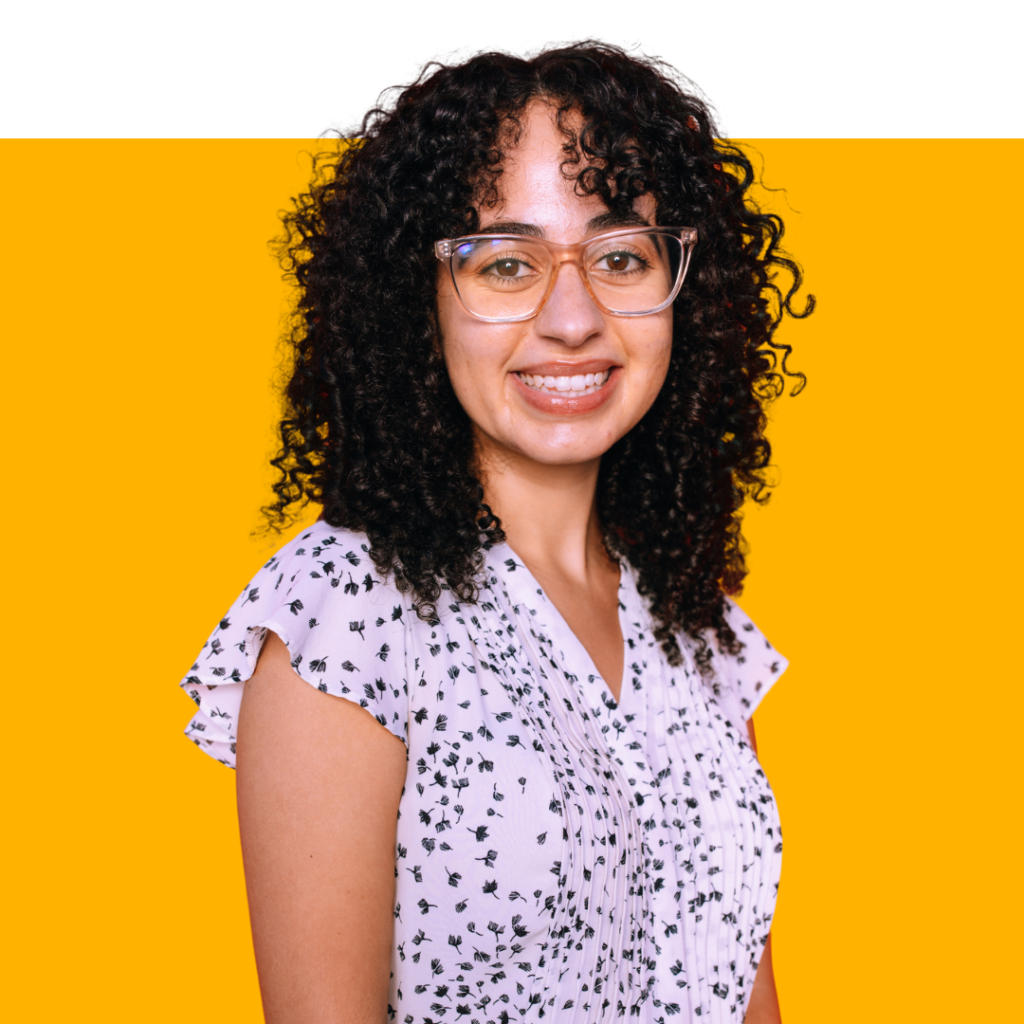
Gabriela Gonzalez (she/her) is a 2nd year Masters of Public Health (MPH) student specializing in Maternal, Child and Adolescent Health (MCAH) at UC Berkeley. She is passionate about reproductive justice and creating happy and safe pregnancy experiences for birthing people and families. Her career goals include policy and advocacy work related to Black maternal health equity and increasing access to community doulas. Prior to beginning her MPH, Gabriela worked with the Los Angeles County Department of Health Services MAMAS Neighborhood program, a nationally and locally funded perinatal services program providing a collaborative care model within a maternity-centered medical home to optimize full-term pregnancy, healthy birth weight, and a continuum of healthy outcomes. In her role as the Project Coordinator, Gabriela provided program support through meeting coordination and facilitation, project management, and reporting for the Healthy Start Initiative. She led the program’s community engagement efforts, participating as a planning team member with the African American Infant and Maternal Mortality (AAIMM) Prevention Initiative. For her recent summer practicum, Gabriela worked with Expecting Justice as their Race Equity Intern where she gained experience creating and analyzing evaluations for a doula and lactation education training, as well as organizing and facilitating a focus group for Black, Latine, and/or Pacific Islander-identifying birthing persons and doulas in San Francisco. Gabriela received her Bachelor of Arts in Sociology with a minor in Women’s and Gender Studies from Loyola Marymount University in 2019. Connect with Gabriela on LinkedIn!
In the summer of 2022, I had the opportunity to work with Expecting Justice (EJ) as their Race Equity Intern. EJ is a San Francisco-based collaborative committed to addressing the impacts of racism on pregnancy disparities among Black, Pasifika (Pacific Islander), and Latine mothers and other birthing parents. Through active engagement with community members and stakeholders, EJ focuses on addressing interpersonal, institutional, and structural racism present within healthcare. EJ has a variety of projects which address the intersecting factors impacting Maternal, Child, and Adolescent Health (MCAH) populations.
In my role I was able to assist with a variety of these projects which shared a common goal of centering community and making widespread impact across systems of care. Having the opportunity to create a post for MCH Leads, I decided to focus on the MCAH competency #11 Working with Communities and Systems because I am passionate about centering community voices in my future work as a public health professional. Often, I hear people in higher education or positions of power say they “want to be a voice for the voiceless.” While well-intended, this mindset perpetuates harms that have long been done to marginalized communities and their exclusion from policy and program decisions related to their livelihood and wellbeing. Instead, we must use our privilege to give community members the opportunity to speak for themselves. Achieving health equity and justice requires systems working with the community rather than for.
Doula Training Evaluations
EJ offers a full-spectrum doula training centered on ancestral knowledge for Black, Pasifika, and Latine-identifying San Francisco residents. Doulas provide emotional, physical, and educational support before, during, and after birth. Some doulas specialize in different areas including abortion, miscarriage, and adoption. Though doulas have been around for centuries, the institutionalization of this practice and medicalization of childbirth has contributed to their inaccessibility, especially among individuals who would benefit the most from their support. Community doulas in particular provide “culturally appropriate support to people in communities at risk of poor outcomes.” Despite research on the impact of community doulas being limited, there has been a growing focus on this model of care and its role in addressing racial disparities in maternal health outcomes and experiences. Eliminating systemic racism is a multifaceted issue doulas alone cannot fix. However, community doulas can provide support to birthing people of color as they navigate a complicated healthcare system.
The training was provided for free and with a barrier removal stipend upon completion.
My Role
In collaboration with the doula access team, we created and administered an evaluation for trainees to complete at the end of the training. Questions addressed what participants enjoyed, what can be done differently moving forward, and feedback related to their satisfaction with the experience. I analyzed the responses and created a data report of the findings, highlighting common themes and integrating both qualitative and quantitative responses.
How does this relate to communities and systems?
The evaluation has various purposes. One is to acquire future funding to allow EJ to continue to (1) offer these trainings, (2) keep them free, and (3) provide a barrier removal stipend. By providing feedback, EJ can advocate among funders and stakeholders for the sustainability of the training and how it will improve health outcomes. Second, EJ will utilize feedback to improve the curriculum, ensuring future trainees feel prepared to efficiently and effectively serve pregnant/parenting people. This will help with assessing goals and objectives and how they will be met and implemented.
Pregnancy Resources Page
My Role
In part of the EJ website relaunch, I gathered culturally competent, reliable, and up-to-date resources for mamas addressing the social determinants of health. With support from EJ’s Abundance Care Team, I heard from those working directly with our mamas what the highest needs were. Resources were related but not limited to breastfeeding, local providers, and social support. It was important to me to go beyond providing information from large institutions. I wanted to include community-based organizations and programs local to the area and that serve EJ’s focus populations. Because of intersecting identities, which can influence one’s health, it is important to recognize the gaps in care when different lived experiences are not considered in the design of the intervention.
How does this relate to communities and systems?
Access to community resources such as safe housing, nutritious food, and mental health support influence our ability to be healthy. Based on 2019 data, 37% of the San Francisco population who are unhoused identify as Black, even though they only make up 6% of the total population in the county. Pacific Islanders, who are less than 1% of the total population in San Francisco, make up 2% of the houseless population. In 2017, Feeding America found at least 13% of San Franciscans experienced food insecurity (which has increased since the start of the COVID-19 pandemic). Those who experience food insecurity at a disproportionately high rate include pregnant people, with those who identify as Latine (26.5%), Black (19.4%), and Pacific Islander (6.6%) showing higher rates. These structural level disparities demonstrate the importance of accessibility to basic necessities and preventative health services for communities at highest risk. Accessibility includes receiving care without fear of discrimination, a real experience among historically marginalized groups when interacting with our healthcare system.
Community Focus Group
My Role
As part of EJ’s doula access efforts, another one of my deliverables was to organize and lead a community focus group. The target population for the focus group were doulas and mamas (currently and/or previously pregnant) residing in San Francisco who identify as Black, Pasifika, or Latine. There were 2 goals by reaching out to these groups. One was to hear from the needs of mamas in the community and the support they need during pregnancy. Additionally, we wanted to hear from them and their experiences with accessing support through doula services. The second goal was to understand areas of support doulas in San Francisco need to be successful. Altogether, hearing from mamas and doulas will inform the curriculum and direction of EJ’s next doula training.
How does this relate to communities and systems?
By bringing together individuals to hear about their lived experiences, EJ is aiming to contribute to change on a larger scale. Being informed by mamas and doulas, EJ is able to identify and understand how to train their next cohort of doulas in order to best serve the community. Engaging with communities offers an opportunity to measure whether you are reaching your goals and objectives. Questions to consider could be whether your focus population knows about available resources, barriers impacting the accessibility of your program, or if you are even reaching your intended audience. Validation from the community leads to effective programs and solutions and, over time, widespread impact.

